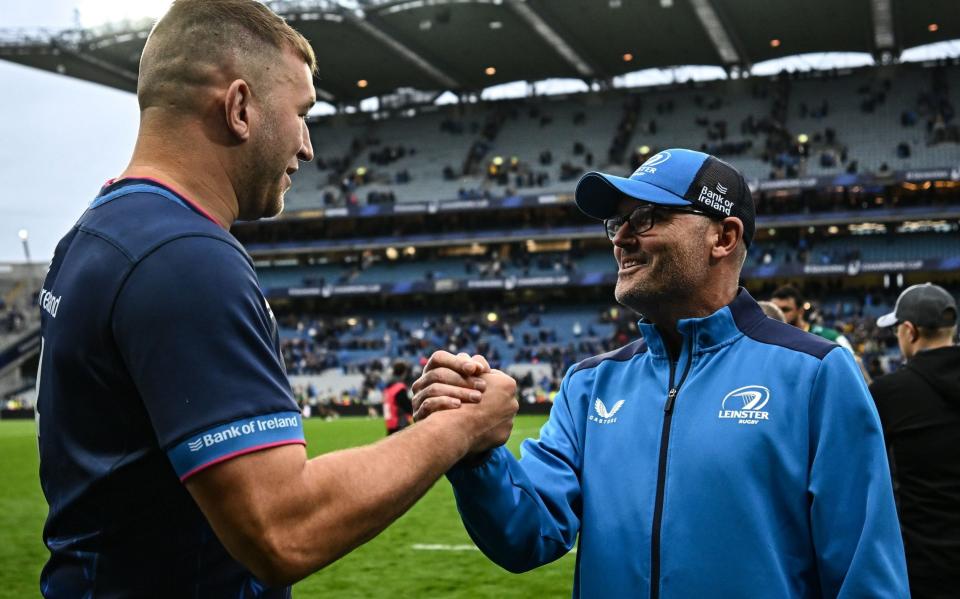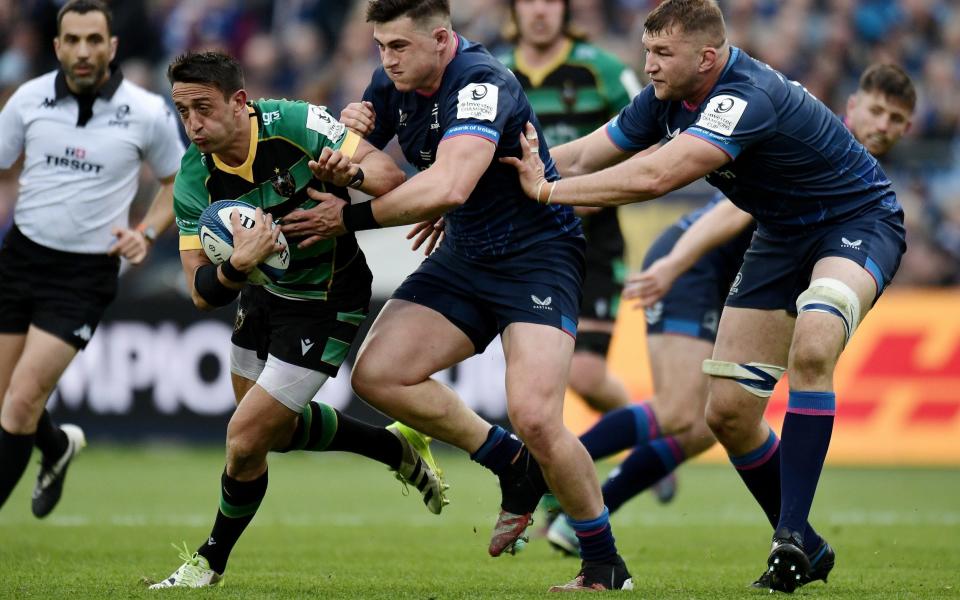Inside the ‘Boksification’ of Leinster under super coach Jacques Nienaber

“Offence sells tickets, defence wins championships.” The maxim is credited to Bear Bryant, one of American college football’s iconic coaches. It may have been weighing heavy on Leinster before this season. Selling tickets was not their problem.
Despite producing mesmeric passages of attack, with Stuart Lancaster helping hone handling skills and collective synergy, Leinster had finished each of the previous two campaigns without a trophy. Losses to La Rochelle in two consecutive Champions Cup finals, by three points in 2022 and a single point in 2023, were particularly galling.
In April of last year, just before the second such defeat, Jacques Nienaber was announced as Lancaster’s replacement. Six months later, Nienaber guided the Springboks to another Webb Ellis cup, meaning he would head to Ireland as a back-to-back Rugby World Cup champion. His reputation, as a defensive mastermind who could plot teams through the most arduous encounters to silverware, was unrivalled.

Though obvious, Nienaber’s brief must have felt reasonably daunting. Leinster had been excellent in just about every area besides the act of crossing the finishing line. The post-Lancaster era was beginning without long-time lynchpin Jonathan Sexton, who retired after the World Cup. And, to some degree, initial success will be judged on the outcome of a single game; this weekend’s Champions Cup final against an imposing Toulouse team.
Nienaber’s first official day on the job was November 27. He was welcomed by a slab of Guinness on his desk at University College Dublin, where he sits opposite Robin McBryde in an open-plan room outside Leo Cullen’s office.
Prior to that, during the province’s pre-season and over the first months of the 2023-24 campaign, former back row Sean O’Brien had been overseeing the Leinster defence. He implemented a few new principles, and had been in regular contact with Nienaber, but the latter’s arrival is said to have “ramped things up”.
As one would expect of a man renowned for his diligence, Nienaber had swotted up on Leinster’s calls so he could hit the training field immediately. Since then, it is understood that the former physio has gradually reshaped training habits. Whereas Lancaster’s “Stuesday” sessions usually hinged upon longer, aerobically demanding passages of game play, Nienaber has focused on intense periods of between two and five phases.
Leinster’s Boksification
Restarts and ‘exit’ routines – essentially gathering kick-offs and moving the ball up-field – have been prioritised with “a huge amount of work”. In the second half against La Rochelle a year ago, Leinster seemed powerless to escape their own half.
Whereas Leinster’s scouting and opposition analysis used to be a collaborative effort from multiple coaches and analysts, Nienaber has taken the lead. Overall, the emphasis on defence has been greater, in 15-on-15 drills and even pre-match warm-ups. Tactically, there has been a palpable Boksification.
Leinster were previously asked to press, scan and then press again as a defensive line while keeping their body shapes as square as possible. Nienaber has urged faster line-speed in a more aggressive blitz. Steadfast principles, separate sources indicated, have freed up players by giving them fewer decisions to make on the hoof.
Outside backs ‘jamming’ in from the edges of the defensive line is a hallmark of this system. Once Leinster have covered the first-receiver and numbered off opposite flat runners and ‘tip-on’ options closer to the ruck, defenders are implored, without exception, to turn in, tear up and rush any attackers – usually key playmakers – who are sitting deeper to receive pull-back passes.
Lancaster is thought to have been more selective with defensive breakdown strategies, preferring to leave rucks alone and fan out against certain opponents. Under Nienaber it is far more common for two defenders – the tackler plus another – to barge into the breakdown to disrupt an attack’s rhythm. South Africa have monitored and coveted ‘battle stats’ and ‘battle rate’ over recent years; essentially how frequently an individual can be effective in physical contests all over the pitch. Leinster seem to think in similar terms these days.
‘No way that mother-f----- will get over’
Lastly, it is said that Nienaber taps into emotion more often than Lancaster did. Chasing the Sun 2, the documentary chronicling South Africa’s 2023 triumph, offered up snippets. Prior to the semi-final, Nienaber froze footage of England attacking New Zealand’s line four years previously in Yokohama. He pointed at a gap close to the breakdown, which Manu Tuilagi shunted through to score.
“Imagine you defend here, and this is your country, the ground behind you,” Nienaber said. “Or this is your family. All your children are playing here. If you make it that f------ personal, there’s no way that mother-f----- will get over the advantage line.”
In the build-up to the World Cup final against the All Blacks, the 51-year-old moved himself to tears during a pep talk as he addressed the difficult upbringings that some of his players had endured.
“Some of you, from where you’re from, shouldn’t even be here,” said Nienaber, voice quivering (watch video below). “This wasn’t supposed to be your movie. But you wrote a different movie. You told the world, ‘f--- you, I’ll show you. I’ll come out on the other side’… We can’t let them script our movie, boys.”
There were questions of whether Nienaber could stir the same passion among men from another country, without the stimulus of the green and gold jersey. That said, he earned rave reviews at Munster, where he worked with Rassie Erasmus, Felix Jones, Alex Walters and Jerry Flannery. We can point to changes in Leinster’s approach.
One rival coach to have faced them this season, after Nienaber’s arrival, discerned a new “emotional edge” about Leinster that has made it more difficult to knock them off their stride. Previously, the source said, “attacking flow would have been their greatest strength”, which meant you could aim to upset Leinster by ripping into the contact area or by kicking ‘long and on’ to coax them into over-playing inside their own half.
While many metrics have stayed constant – Leinster conceded 15.25 points per game during last season’s Champions Cup campaign and have shipped an average of 15 points per game this term – others feel informative. Leinster’s average of ‘dominant tackles’ in Champions Cup games, as categorised by Stats Perform, has risen from 8.25 last season to 12.43. The respective rises of Joe McCarthy and Ryan Baird, two immensely athletic back-five forwards, suit Nienaber’s methods.
Leinster have kicked more (from 25.5 kicks per game for 826 kicking metres, to 32.14 kicks for 978 kicking metres), yet they have conceded more line-breaks: having given up 4.43 per Champions Cup match in 2023-24 compared to just 2.75 the previous season.
The latter is an obvious consequence of bedding in the risk-reward blitz. Carrick Blake, the Cambridge RFC analyst, has crunched Oval Insights data to develop a metric known as passes per defensive action (PPDA), which measures defensive pressure. Last season, Leinster were outside the top 30 per cent among teams in the Premiership, the United Rugby Championship and the Top 14 for PPDA. Now, according to Blake’s studies, they are in the top three per cent.
A 20-17 victory over Northampton Saints in the Champions Cup semi-final at Croke Park featured quintessential Nienaber moments. It is understood that his pre-match scouting had zeroed in on Saints’ strike plays from scrums and line-outs. Nienaber, who wanted to pressurise Northampton to a degree that they had not experienced over a fine season up until that fixture, identified that Saints often ran shortened line-outs and only committed two players to the first midfield ruck. Leinster put additional focus on spoiling those particular breakdowns and Northampton struggled desperately for fluency.

On the verge of half-time, when Saints finally outflanked the Leinster blitz, the sight of Jordan Larmour and Andrew Porter corner-flagging fiendishly was reminiscent of the Springboks. Finding space on the outside is one thing. Scoring a try is altogether tougher. Outside of fantastic patches early in each half, Leinster were not especially dazzling in attack against Saints. They needed to scramble in the dying stages, with Caelan Doris pouncing for a vital jackal. Nienaber’s charges pulled through a tight knockout game. Where have you seen that before?
Leinster’s two wins over La Rochelle had banished a demon and now they confront another as the final comes into focus. Toulouse have been magnificent thus far. Containing Antoine Dupont will be on Nienaber’s checklist, and he can draw upon experience. In the World Cup quarter-final seven months ago, Eben Etzebeth toed the offside line before ruffling Dupont into a poor pass. South Africa struck off the ensuing turnover, Jesse Kriel’s grubber finding Cheslin Kolbe.
This weekend is bound to be a similar tale of streetwise interventions that become big moments over a game decided by fine, fine margins. Fortunately for Leinster, Nienaber tends to be on the right side of those things.

 Yahoo Sport
Yahoo Sport 




































































